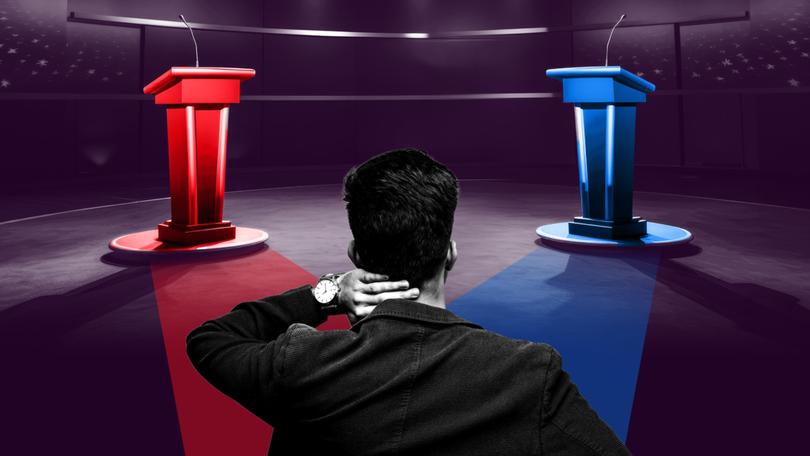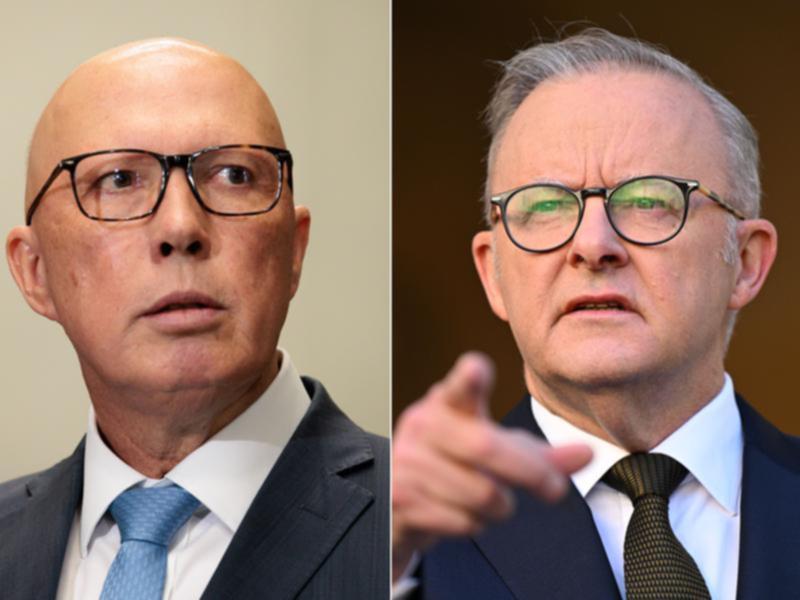Federal election 2025: Leaders’ debate the first real test for Albanese and Dutton to sell their messages
Anthony Albanese and Peter Dutton will be forced out of their echo chambers and into the debating chamber when they go head-to-head this evening.

Prime Minister Anthony Albanese and Opposition Leader Peter Dutton will be forced out of their echo chambers and into the debating chamber when they go head-to-head in their first face-off of the campaign this evening.
The two leaders have been sniping each other from a distance as they have criss-crossed the length and breadth of the country in the first week of hustings.
But now they must emerge from the cocoons of their highly orchestrated campaigns to face each other, and members of the public, directly at the first of two confirmed debates ahead of the May 3 poll.
Sign up to The Nightly's newsletters.
Get the first look at the digital newspaper, curated daily stories and breaking headlines delivered to your inbox.
By continuing you agree to our Terms and Privacy Policy.At Tuesday’s live sparring match in western Sydney, moderated by Sky News chief anchor Kieran Gilbert, Mr Albanese and Mr Dutton will be fielding questions from a “people’s forum” of 100 undecided voters starting from 7.30pm (AEST).
Their second performance next week will be a more conventional-style debate hosted by the ABC Insiders’ frontman David Speers, where each leader will make opening and closing statements and be afforded equal time to answer questions.
This week’s contest will be all the more telling as poll after poll shows that an unprecedented number of soft and swing voters, disillusioned with what the major parties have to offer, are putting more key seats in play.
With a future minority government or hung parliament still very much on the cards, both leaders will be hoping the cogency of their policy, and particularly economic, arguments will hold the key to making a dent in the undecided vote.
“Leader debates rarely matter but with around 45 per cent of the national vote being soft these debates have relevance as both leaders need to establish each has the better economic credentials,” said Tony Barry, director of corporate affairs and communications at the Redbridge Group.
“The other strategic objective in these leader debates is to offer this soft vote segment hope through salient but differentiated policies because at the moment these voters remain very pessimistic about their futures,” he added.
Tuesday’s Australia Decides event, hosted by Sky News and The Daily Telegraph, comes as Mr Albanese is widely viewed to have been the early winner from the campaign.
But the grilling of both leaders - who have so far barely interacted with unvetted members of the public – will be a significant marker of how they are cutting through with their cost-of-living offers.
“I think people will be very direct and specific about what’s going on in their life,” said Dr Andrew Hughes, a political marketing expert from the Australian National University.
“There’s no real sense that either party has a plan to improve our lives, other than just tough it out and wait for things to get better. It’s disenfranchising younger voters, and I think that’s been picked up by the strength of the teals,” he said.
While the momentum was currently with Labor, both sides had an uphill battle ahead to win over not only Gen Z voters but also the “middle class battlers” in the 35 to 54 age group, argued Dr Hughes.
Cost-of-living issues, the economy and housing are expected to be at the forefront of the debate.
“I think Labor’s economic management will be questioned, because the budget is not improving. We’re about to go over to a trillion dollars in debt sometime this year,” he added.
“Labor have been running a nice distraction campaign so far to avoid talk about the economy. All the things they’ve talked about so far, like health, PBS, tax cuts, they’re getting away from the broader discussion on the economy in general.”
Both parties were on the hook when it came to connecting better with younger generations facing a lifetime of rent and the end of the “Great Australian Dream” of home ownership, he argued.

Neither party was performing particularly well. Labor’s campaign was solid but dull and focusing on small targets, while the Coalition was lacking tangible offers beyond fuel subsidies and its policy to free up gas reserves, said Dr Hughes.
The Prime Minister currently had an edge over Mr Dutton as he had more positive policy announcements to talk about, forcing the Opposition Leader to stray back onto negative territory.
Leo Shanahan, a director of research and advisory firm Freshwater Strategy, agreed that the focal point of the debate would be economic management, particularly with the backdrop of global markets plummeting after the US tariffs decision.
This presented an opening for Mr Dutton, he said.
“All the research shows that people still think the Coalition are better economic managers, so he’ll have to lean into that a lot in terms of this is now an opportunity for him to explain what he intends to do and take full advantage of this opportunity.”
Mr Albanese had been less convincing on this point during an inflationary crisis but could take advantage of incumbency to convince voters against change in uncertain times.
“In terms of those areas where undecideds are thinking the most is in economic management. We’re yet to see where that’s breaking,” said Mr Shanahan.
“Where it’s going to make a difference is those hip pocket issues, and there’s competition in the market in terms of tax cut versus petrol excise.”
Professor Mark Kenny, director of the Australian Studies Institute, said the primary challenge for both leaders was obviously not to lose the debate, while projecting confidence, competence and a sense of authority and being across the detail.
He added that one of the great advantages of taking questions directly from the audience was that it changed the tone of the conversation, making it less confrontational.
“I do think people get interested in politics when they see genuine interface between leaders and themselves,” he said.
“It can be quite telling, quite instructive, as to where the leaders stand,” he said, arguing that politicians had to behave differently towards the public than combative journalists.
“If they think an interviewer is being impudent or overly insistent or interrupting too much or being rude, then your average voter won’t mind if a political leader slaps them down,” he said.
“But try slapping down a member of the public for a question that you don’t like, and that is a big red line.”

